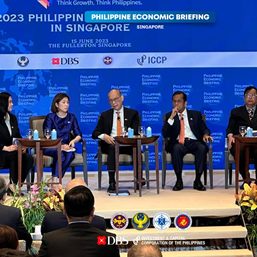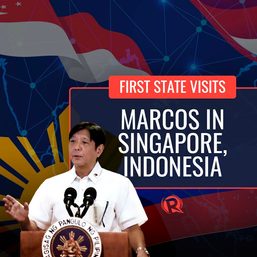SUMMARY
This is AI generated summarization, which may have errors. For context, always refer to the full article.
![[OPINION] Controversy over ASEAN’s ‘Swift’ week](https://www.rappler.com/tachyon/2024/03/tl-asean-swift-week.jpg)
Pop star phenomenon, Taylor Swift, did 66 concerts across the Americas last year, which reportedly earned over US$1billion, contributing to her selection as Time Magazine’s 2023 Person of the Year. This week, she was booked for six shows in Singapore. The show was more expensive for the 70% of the fans who were not Singaporean residents and who also had to spend for transport and accommodations.
VIP tickets, airfare, and accommodations to watch three shows, cost a Filipino Swiftie $6,000, which approximated the country’s average annual household income. ASEAN fans had no choice but to go to Singapore; Swift would not perform anywhere else in the region. Thai Prime Minister Srettha Thavisin disclosed at a meeting last month that Singapore had paid for the exclusive right to stage Swift’s Southeast Asia concerts, an arrangement that invited critical comments from official sources.
The most acerbic attack, surprisingly, came from Representative Joey Salceda, who normally addresses more substantive economic and political issues. Some aspects of the event would justify criticism. Banking on increased tourism traffic, Singapore hotels raised room rates by 30%. Even budget airlines operating in the region could charge almost double the cheapest flights available to bargain-hunters weeks ahead and beyond the Swift playdates.
But can or should government prevent enterprises from charging the costs fans are willing to bear to indulge their pleasures? Salceda, an advocate of economic freedom and free markets, would probably not condone such an intervention. Still, one must sympathize with those who needed to travel to Singapore, not for a concert but for family medical emergencies, and were subjected to inflated rates. Salceda did not take up such issues. He asked the DFA to register the country’s official opposition to Singapore dealmaking becauseit violated the “principle of consensus-based relations and solidarity on which the ASEAN was founded.”
Also somewhat surprising, Singapore Prime Minister Lee Hsien Loong publicly addressed this criticism. Perhaps, he had no choice except to respond to a direct question on the issue at a press conference in Melbourne with Australian Prime Minister Anthony Albanese. The money for the exclusive right to the concerts came from the Singapore Tourism Board (STB), which had received a S$300 million top-up in the 2024 budget to reinforce its post-pandemic plan to boost tourism. Lee also pointed out that the STB had been supporting international leisure events through grants since 1998. He also claimed regional benefits from Singapore projects because the tourists who go to Singapore for entertainment also tended to visit other ASEAN destinations.
Law of the jungle
The response did not pacify Salceda, who doubled down instead, taking Lee’s words as expressing the “law of the jungle,” where “the weak must do what it can, but the strong can do what it wants.” But there is no evidence that Swift acted under duress. The exclusivity granted to Singapore appears to have been negotiated between two independent parties for mutual benefit. Conceivably, Swift might have made more money doing concerts in other countries, but at the cost of additional time and effort. Would the transaction have played differently if Swift had been presented as selling at a premium all of her available playdates during her tour, rather than Singapore seeming to “bribe” her to boycott other ASEAN sites? Would Swift have been accused of breaching some ethical principle?
Swift had no obligation and no commitment to perform in any country. Artists familiar with the logistics and technical requirements for Swift’s concerts, doubted, first, whether other countries in the region had venues with the stage dimensions, seating capacity, and audiovisual, electronic technology that could support her programs. But, also whether these countries had efficient airports, airline connections and hotels to accommodate fans coming from elsewhere in the region. Did Salceda really believe that the government had a chance to bring Taylor Swift to Manila?
Thailand, with its massive tourism and entertainment infrastructure, could possibly have competed with Singapore in offering a venue for Swift concerts. Which was, perhaps, why Srettha Thavisin felt regret and chagrin that Singapore had beaten Bangkok to the punch. Coming on the heels of Lee’s response in Melbourne, the Thai Prime Minister’s office released a statement to clarify that Srettha’s comments last month on the deal with Swift should not be construed as expressing criticism or jealousy directed at Singapore; he raised the topic “to admire and compliment Singapore.” And to advise countries wishing to promote tourism to study Singapore’s strategy. “The deal is a ‘normal business practice’ and there is ‘no reason why Singapore should be ashamed of its actions.’”
Rather than confront Singapore with a DFA demand to explain its exclusivity arrangements with Swift, Salceda should, perhaps, explore how to encourage and enable Philippine tourism authorities to exercise Singaporean-style initiatives. Salceda’s caustic criticism of Singapore’s departure from principled consensus-based relations and regional solidarity was also badly timed, unfortunately coming at a time of increasing tension with the People’s Republic of China.
Salceda rightly expresses concerns about the danger of allowing the law of the jungle to prevail in the region. But his alarm and anger appear more appropriately focused, not on contractual arrangements over Taylor Swift concerts in Singapore, but on the PRC’s persistent, aggressive actions against the Philippines in its own Exclusive Economic Zone. – Rappler.com
1 comment
How does this make you feel?


![[ANALYSIS] How one company boosts farmer productivity inside the farm gate](https://www.rappler.com/tachyon/2024/06/bioprime-farmgate-farmer-productivity-boost.jpg?resize=257%2C257&crop=465px%2C0px%2C1080px%2C1080px)

![[In This Economy] Is the Philippines quietly getting richer?](https://www.rappler.com/tachyon/2024/04/20240426-Philippines-quietly-getting-richer.jpg?resize=257%2C257&crop=194px%2C0px%2C720px%2C720px)













I agree: “Salceda should, perhaps, explore how to encourage and enable Philippine tourism authorities to exercise Singaporean-style initiatives.” Preparing for such initiatives should be improving our tourism infrastructure, the most important of which is our Ninoy Aquino International Airport. If Singapore adheres to the Law of the Jungle, it should be understood that the same Law dominates our Political System, too. Lastly, I agree that Salceda’s “alarm and anger … (should be) more appropriately focused, not on contractual arrangements over Taylor Swift concerts in Singapore, but on the PRC’s persistent, aggressive actions against the Philippines in its own Exclusive Economic Zone.” This proposed action will significantly benefit more Filipinos in the long run.